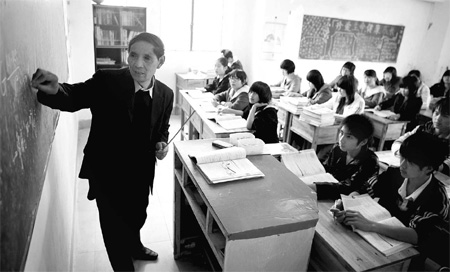Focus
Tired, stressed and 'fed up'
By He Na (China Daily)
Updated: 2010-09-10 07:41
 |
Large Medium Small |
|
Children of migrant workers from Sichuan province listen to a lecture given by a teacher at a middle school in Jinjiang, Fujian province. Teachers complain they suffer great stress in the classroom. Qiu Haiying / for China Daily |
With so much riding on results, principals pass on this pressure to teachers on the frontline.
"In a way, the rankings and students' scores have become the key criteria for schools and parents to evaluate the capability of a teacher," said Gan Yuan, principal of Changchun No 125 Junior Middle School. "We don't want to but the education system forces us to do that."
He admitted, however, that the strain often proves too much.
"We called the 120 emergency hotline for ambulances several times last semester," added Gan. "It's common for teachers to suddenly collapse while giving classes."
Psychological warfare
Even teachers whose students consistently perform well are not spared the intense scrutiny. Tao teaches 50 children in Changchun and her class is considered to be the best in the school.
Yet, all it has done, she said, has raised the expectations of parents even further.
"Many people say it's an honor to be so highly regarded but, for me, it means day after day of exhausting work," the 52-year-old told China Daily. "I have great difficulty sleeping at night after I finish marking homework and preparing for the next day's class.
"My home telephone is like an emergency hotline for concerned parents," she said, adding that she once spent three hours answering calls.
Most schools also adhere to a policy of "transparent teaching", which means officials and parents can observe classes whenever they choose.
"At least two parents come and sit at the back of my classroom every day," said Luo Jing, 29, who teaches English in Changchun. "I have taught the same textbooks for six years but still I'm nervous whenever I see them staring directly at me."
Students are also fueling the increase in stress, with teachers now engaged in psychological warfare with what experts claim is the most uncommunicative generation there has ever been.
A large proportion of China's school children are from single-child families and, in Luo's experience, that means they are "self-centered and rebellious" and "vulnerable to even the smallest hardship or setback".
"We often joke every day's a battle of wits and courage," she said.
Others claim that children from one-parent families also tend to be more introverted and sensitive compared to their peers, especially the children of migrant workers.
"Teachers today don't want more responsibility," said principal Gan. "There are some who say to me that if I insist on giving them more responsibility they will have no choice but to resign."
Evaluation systems in operation at most universities even allow students to grade their tutors, who face being fired if they receive too much negative feedback.
The irony, say critics, is that teachers who go easy on their class often get higher marks than their stricter colleagues.
Calm on campus
Although the Ministry of Education has called on schools nationwide to lighten the load on the shoulders of China's youth, it appears the teachers too need help to ease their burdens.
"It's time we had a professional psychology network that focuses on teachers, especially those in primary and secondary schools, to help them cope," said Tang Linchun, an associate researcher with the Shanghai Academy of Educational Sciences.
"Of course, more understanding and cooperation from parents and students is also needed to relieve the workload," he added.
Beijing Normal University already offers a free course in psychology to all students, which is reaping rewards, especially for those students who are determined to become teachers. The program could be rolled out across the country.
Many schools have also begun organizing fun tours for teachers at the end of every semester, while teachers in Beijing have designated Mondays and Tuesdays "No Complaints Day" to help ease the mood on campus.
However, Nie Zhenwei, director of Beijing Normal University's psychological counseling center, insists the long-term solution is to improve the education for trainee teachers and offer better post-employment services.
"Teachers need to be all-rounders," she said, "so they need to learn how to cope with problems they might face in the future."
The central government has made moves to shift toward a system of quality-orientated education, yet the senior middle school and college entrance exams still have the power to make or break careers.
Educational backgrounds also remain the chief concern of employers when hiring new staff.
"Without a fundamental reform to get away from this deep-rooted fixation with exam performance, it will be hard to ease the pressure on both teachers and students," said Nie.
Gan in Changchun, however, said such a move is "unrealistic at this time" but suggested that a good start would be for the government to "cancel unnecessary checks and visit to schools to give us a more peaceful teaching environment".

